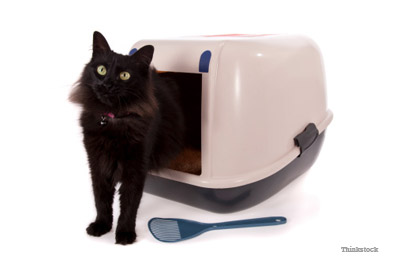
We all do it. We do it every time we change the litter or hear the call of compacted clay being clawed. I’m talking about inspecting our cat’s poop. We humans are inexplicably interested in monitoring our companion animal’s eliminations. And that’s a good thing. Identifying a “bathroom problem” early can prevent more serious complications and restore health to an ailing kitty. According to the petinsurance.com, “intestinal upset/diarrhea” was the sixth top medical condition of cats in 2015. One of the most common intestinal irregularities cat parents report is blood or mucus in the stool. Should you worry if you spot beads of blood or mounds of mucus in the litter box? Let’s find out.
What does normal cat poop look like?
Tootsie-Rolls. Yes, I went there. Normal cat poops are about two to three inches long, one-half inch in diameter, well-formed, and brown to tan in color. If you’re wondering, researchers at the U.K.’s Waltham Centre for Pet Nutrition published a handy illustrated “Faeces Scoring System” you should check out. If your cat has abnormal stools, you can “grade” the feces. Grading the fecal quality and estimating the quantity can help your veterinarian more quickly, and correctly, diagnose your cat’s condition.
Most cats defecate once daily. The odor shouldn’t knock you out. You should be able to pick up the stool without it running through your fingers (if you’re into picking up poop by hand). I’ll leave it at that. They make litter box utensils, if you’re wondering. And gloves, if you insist on handling these sorts of things.
What does blood look like in my cat’s poop?
Blood in a cat’s poop can be challenging to identify. For starters, litter can sometimes alter the color and conceal – or create – changes in appearance. If the blood originates in the lower intestinal tract, especially the distal colon (large intestine) or rectal region, it will most likely look like, well, blood. Red or pink drops or smears are frequently discovered on the sides of the litter box and on top of the stool or litter.
Blood from higher in the intestinal tract, particularly the small intestine, will be black or brown. This color change is due to partial digestion by enzymes secreted in the small intestine. This blood will often appear as dark flecks, specks, or coffee grounds.
It’s important to note that both constipation and diarrhea can cause blood in the stool of cats. Bright red blood without either diarrhea or hard, dry stools generally indicates the problem is closer to the rectum and anus.
What about mucus in poop?
Slimy. Slippery. Yucky. These are all terms I’ve heard from cat parents describing excessive mucus in their cat’s stool. Mucus is a normal secretion of the intestinal tract to help lubricate and moisten the linings and facilitate fecal passage. It’s not unusual to observe some greasy or slick coatings on your cat’s feces. It is abnormal to see lots of slimy, often clear to pale yellow-green liquid accompanying your cat’s bowel movements. Fecal mucus is an example of “more is worse.”
What causes blood or mucus in my cat’s poop?
There can be many causes of blood or mucus in a cat’s poop. Some common reasons include:
- Dietary changes and food intolerance
- Inflammatory bowel disease (IBD)
- Intestinal parasites such as Giardia
- Infections
- Trauma or abscess
- Rectal polyps or tumors
- Anal gland abscess or infection
- Constipation or idiopathic feline megacolon
- Poisons or toxins
- Cancer
What should I do if I see blood or mucus in my cat’s poop?
Any changes in your cat’s bowel movements should be reported to your veterinarian immediately. Today’s constipation can become tomorrow’s intestinal obstruction. This morning’s loose stool can lead to dehydrating diarrhea overnight. Blood in the stool, red or black, is always concerning. Digested dark blood can signal a serious condition while red blood can be anything from benign food changes to cancer.
What will my veterinarian do to determine the cause of the blood or mucus in my cat’s poop?
Most of these problems can be diagnosed on medical history, physical examination, and microscopic fecal evaluation. Your veterinarian will search for blood, parasites, bacteria, and other indicators of the cause. In more serious cases, x-rays, ultrasound, and blood and urine tests will be conducted. Treatment will be based on the exact diagnosis.
If you notice anything odd in your cat’s poop, don’t delay; seek veterinary help. I’ve seen too many cats too late to help, simply because their guardian hoped it would resolve on its own. My best advice is keep spying on your cat’s litter box. You don’t have to tell anybody; your secret is safe with me.
If you’re not sure, ask your veterinarian – he or she will be your best resource in determining which toys and objects are safe for your cat and can also give you advice on how to prevent your cat from eating strange objects.
